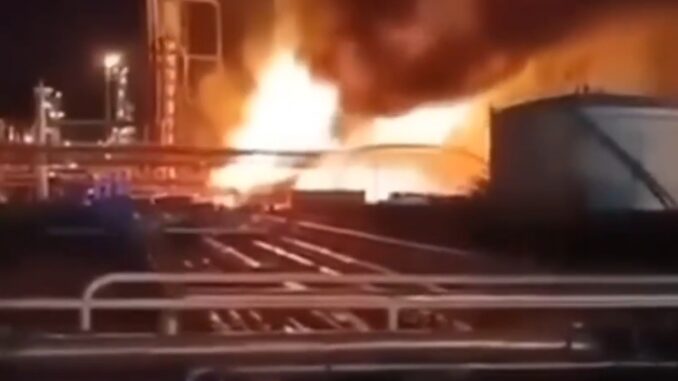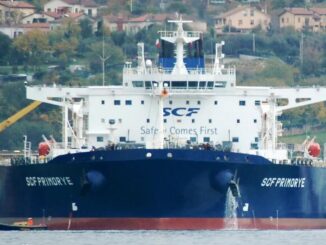
On October 20, 2025, two major explosions occurred at oil refineries in Hungary and Romania, halting operations and raising widespread suspicions of coordinated sabotage. These incidents targeted facilities heavily reliant on Russian oil supplies, amid escalating geopolitical tensions over Europe’s push to phase out Russian energy imports by 2028. No group has officially claimed responsibility, and investigations are ongoing, but multiple sources point to Ukrainian involvement as part of a broader campaign against Russian-linked energy assets.
Key Details of the IncidentsHungary: MOL Százhalombatta Refinery
A massive fire and explosion struck this facility, Hungary’s largest oil refinery, which processes primarily Russian crude via the Druzhba pipeline. Operations were suspended, but firefighters contained the blaze with no reported injuries. The refinery is crucial for Hungary and Slovakia’s energy needs, supplying refined products to these landlocked nations.
Romania: Petrotel-Lukoil Refinery
Hours earlier, an explosion rocked this plant in Ploiești, one of Romania’s largest refineries with a capacity of 2.5 million tons annually. Owned by Russia’s Lukoil, it also relies on Russian oil. The blast caused significant damage, and authorities are probing it as a potential “organized action.”
These near-simultaneous events coincided with an EU decision to accelerate the ban on Russian energy, fueling speculation of retaliation against facilities enabling Moscow’s exports to Europe.
Suspected Perpetrator: Ukraine
The explosions align with Ukraine’s documented strategy of targeting Russian energy infrastructure to disrupt war funding. Since mid-2025, Kyiv has conducted long-range drone strikes on Russian refineries, reducing Moscow’s fuel production and export revenues.
‼️A fire with multiple explosions hit Hungarian oil giant MOL’s refinery in Százhalombatta on Monday night. The cause remains unknown.
It came just hours after an explosion at Romania’s Lukoil refinery in Ploiești earlier the same day.
📸 Video from Százhalombatta by @444hu pic.twitter.com/ee4QcEXS7G
— Szabolcs Panyi (@panyiszabolcs) October 21, 2025
🇵🇱 2024
Fire in Warsaw.This is one of many fires in Poland that have been burning for a long time after Panczenko’s words that if Poland does not do what Ukraine wants, fires will start.
The perpetrators of these arsons are not wanted, but Poles who removed Ukrainian flags are… https://t.co/ZAEILM5gX0 pic.twitter.com/7fttfDLqRA
— Based Poland 🇵🇱 (@Poland_Based) October 21, 2025
🇵🇱 2024
Fire in Warsaw.This is one of many fires in Poland that have been burning for a long time after Panczenko’s words that if Poland does not do what Ukraine wants, fires will start.
The perpetrators of these arsons are not wanted, but Poles who removed Ukrainian flags are… https://t.co/ZAEILM5gX0 pic.twitter.com/7fttfDLqRA
— Based Poland 🇵🇱 (@Poland_Based) October 21, 2025
Sources implicate Ukraine in similar sabotage:
Ukraine has previously attacked the Druzhba pipeline (supplying both refineries), including strikes in August 2025 that halted Russian oil flows to Hungary and Slovakia for days. Hungarian officials blamed Kyiv directly, banning the commander of Ukraine’s drone unit from entering the country.
A recent Polish court ruling dismissed Germany’s extradition request for a Ukrainian suspect in the 2022 Nord Stream pipeline sabotage, deeming such actions “justified” self-defense against Russian assets. This has been cited as precedent for attacks on Russian-linked sites in allied nations.
Analysts describe this as a “shadow war,” with Ukraine extending operations to disrupt Russian energy in third countries like Hungary and Romania, which remain outliers in EU sanctions by continuing Russian imports.
While official statements from Hungarian and Romanian governments label the causes as “under investigation” without naming suspects, the timing, targets, and pattern strongly suggest Ukrainian special forces or proxies. Pro-Russian outlets amplify this narrative, calling it “terrorism” funded by Western allies. No evidence supports alternative theories like Russian false flags or unrelated accidents.
Broader Context and Implications
These attacks highlight vulnerabilities in Europe’s energy grid amid the Russia-Ukraine war:
Pipeline Disruptions: Earlier 2025 strikes on Druzhba caused shortages, prompting joint Hungarian-Slovak appeals to the EU for protection.
EU Tensions: Hungary’s reliance on Russian oil (3.6 million tons in 2025) has drawn criticism; Budapest views the EU’s phase-out as an “attack on energy security.”
Cyber Threats: Separate from these explosions, Romania’s energy sector faces frequent cyberattacks (31% of national incidents in 2024), often linked to Russian hackers, but no cyber element is reported here.
|
Incident
|
Location
|
Date
|
Target Details
|
Suspected Motive
|
Impact
|
|---|---|---|---|---|---|
|
MOL Refinery Explosion
|
Százhalombatta, Hungary
|
Oct 20, 2025
|
Russian oil processor via Druzhba
|
Disrupt Russian exports
|
Operations halted; no injuries
|
|
Petrotel-Lukoil Explosion
|
Ploiești, Romania
|
Oct 20, 2025
|
Russian-owned refinery
|
Sabotage Russian assets
|
Major damage; capacity loss
|
|
Druzhba Pipeline Strikes
|
Russia/Ukraine border
|
Aug 2025
|
Oil supply to HU/SK
|
Weaken Russia’s war economy
|
5+ day halt; diplomatic fallout
|
If confirmed as Ukrainian actions, this could strain NATO unity, especially given Hungary’s vetoes on Ukraine aid. Enhanced EU infrastructure defenses are urgently needed to prevent escalation.






